虚拟语气与各种句型
虚拟语气的八种情况
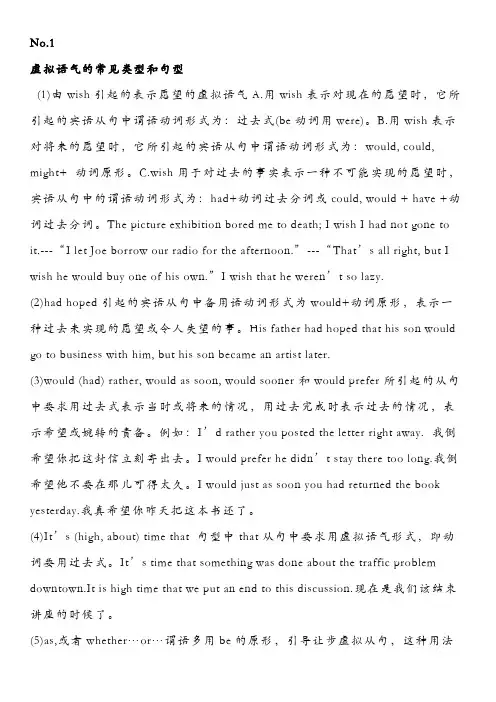
No.1虚拟语气的常见类型和句型(1)由wish引起的表示愿望的虚拟语气A.用wish表示对现在的愿望时,它所引起的宾语从句中谓语动词形式为:过去式(be动词用were)。
B.用wish表示对将来的愿望时,它所引起的宾语从句中谓语动词形式为:would, could, might+ 动词原形。
C.wish用于对过去的事实表示一种不可能实现的愿望时,宾语从句中的谓语动词形式为:had+动词过去分词或could, would + have +动词过去分词。
The picture exhibition bored me to death; I wish I had not gone to it.---“I let Joe borrow our radio for the afternoon.”---“That’s all right, but I wish he would buy one of his own.”I wish that he weren’t so lazy.(2)had hoped引起的宾语从句中备用语动词形式为would+动词原形,表示一种过去未实现的愿望或令人失望的事。
His father had hoped that his son would go to business with him, but his son became an artist later.(3)would (had) rather, would as soon, would sooner和would prefer所引起的从句中要求用过去式表示当时或将来的情况,用过去完成时表示过去的情况,表示希望或婉转的责备。
例如:I’d rather you posted the letter right away. 我倒希望你把这封信立刻寄出去。
I would prefer he didn’t stay there too long.我倒希望他不要在那儿可得太久。
虚拟语气用法及动词形式
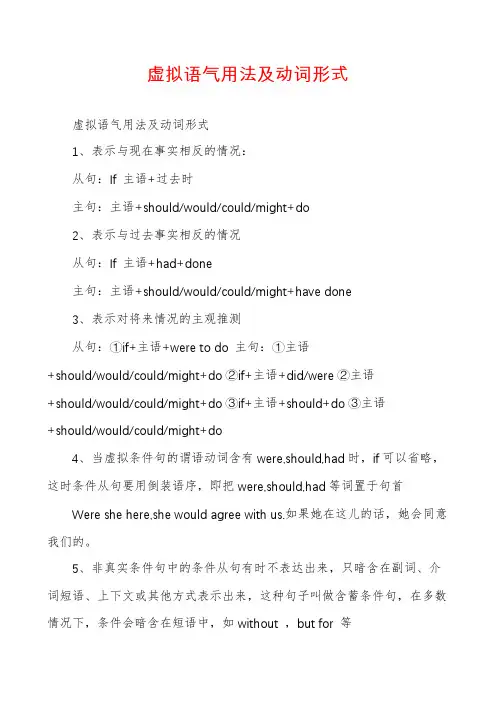
虚拟语气用法及动词形式虚拟语气用法及动词形式1、表示与现在事实相反的情况:从句:If 主语+过去时主句:主语+should/would/could/might+do2、表示与过去事实相反的情况从句:If 主语+had+done主句:主语+should/would/could/might+have done3、表示对将来情况的主观推测从句:①if+主语+were to do 主句:①主语+should/would/could/might+do ②if+主语+did/were ②主语+should/would/could/might+do ③if+主语+should+do ③主语+should/would/could/might+do4、当虚拟条件句的谓语动词含有were,should,had时,if可以省略,这时条件从句要用倒装语序,即把were,should,had等词置于句首Were she here,she would agree with us.如果她在这儿的话,她会同意我们的。
5、非真实条件句中的条件从句有时不表达出来,只暗含在副词、介词短语、上下文或其他方式表示出来,这种句子叫做含蓄条件句,在多数情况下,条件会暗含在短语中,如without ,but for 等But for his help,we would be working now. 要不是他的帮助,我们还会在工作呢。
6、注意,在虚拟语气的从句中,动词be的过去时态一律用were,不用was。
wish 后宾语从句a、表示与现在事实相反的愿望,谓语动词用过去式b、表示与过去事实相反的愿望,谓语动词:had+donec、表示将来难以实现的愿望谓语动词:should/would(情态动词)+ 动词原形(注:if only引导的感叹句和as if/as though引导的状语从句也有相同用法)目的状语从句1、在for fear that,in case,lest引导的从句中,若用虚拟语气时,从句谓语为:should + do。
高中英语知识点归纳虚拟语气的用法与句型
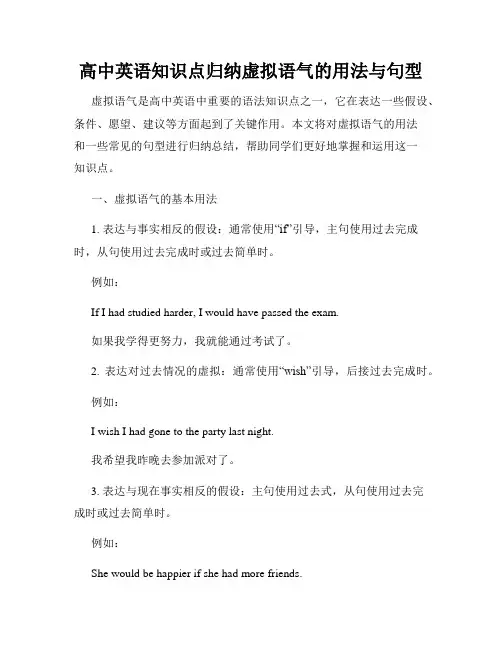
高中英语知识点归纳虚拟语气的用法与句型虚拟语气是高中英语中重要的语法知识点之一,它在表达一些假设、条件、愿望、建议等方面起到了关键作用。
本文将对虚拟语气的用法和一些常见的句型进行归纳总结,帮助同学们更好地掌握和运用这一知识点。
一、虚拟语气的基本用法1. 表达与事实相反的假设:通常使用“if”引导,主句使用过去完成时,从句使用过去完成时或过去简单时。
例如:If I had studied harder, I would have passed the exam.如果我学得更努力,我就能通过考试了。
2. 表达对过去情况的虚拟:通常使用“wish”引导,后接过去完成时。
例如:I wish I had gone to the party last night.我希望我昨晚去参加派对了。
3. 表达与现在事实相反的假设:主句使用过去式,从句使用过去完成时或过去简单时。
例如:She would be happier if she had more friends.如果她有更多朋友,她会更开心。
4. 表达对现在情况的虚拟:通常使用“wish”引导,后接过去时。
例如:I wish I were a bird and could fly in the sky.我希望我是一只鸟,可以在天空中飞翔。
5. 表达对将来的不可能或不太可能的情况:主句使用过去式,从句使用过去完成时。
例如:If I were you, I would not go to that dangerous place.如果我是你,我不会去那个危险的地方。
二、常见虚拟语气句型1. 虚拟语气与建议:It is important (necessary, advisable, essential, etc.) that + 主语 + (should) + 动词原形例如:It is necessary that you (should) finish your homework before playing games.你在玩游戏前完成作业是必要的。
虚拟语气在各种从句中的应用
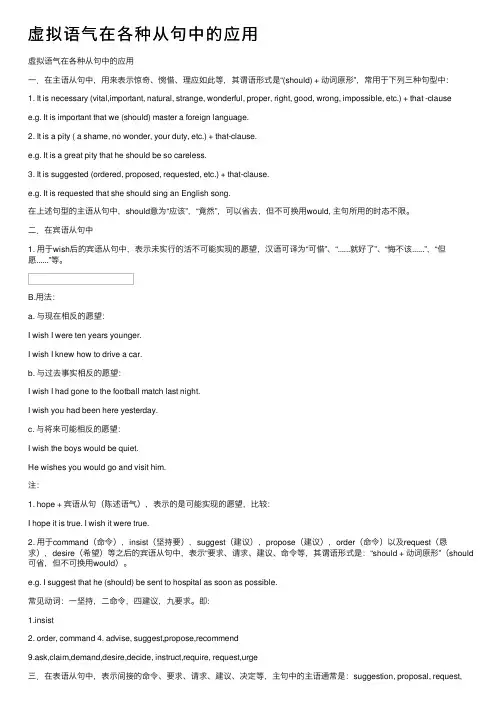
虚拟语⽓在各种从句中的应⽤虚拟语⽓在各种从句中的应⽤⼀.在主语从句中,⽤来表⽰惊奇、惋惜、理应如此等,其谓语形式是“(should) + 动词原形”,常⽤于下列三种句型中:1. It is necessary (vital,important, natural, strange, wonderful, proper, right, good, wrong, impossible, etc.) + that -clausee.g. It is important that we (should) master a foreign language.2. It is a pity ( a shame, no wonder, your duty, etc.) + that-clause.e.g. It is a great pity that he should be so careless.3. It is suggested (ordered, proposed, requested, etc.) + that-clause.e.g. It is requested that she should sing an English song.在上述句型的主语从句中,should意为“应该”,“竟然”,可以省去,但不可换⽤would, 主句所⽤的时态不限。
⼆.在宾语从句中1. ⽤于wish后的宾语从句中,表⽰未实⾏的活不可能实现的愿望,汉语可译为“可惜”、“......就好了”、“悔不该......”,“但愿......”等。
B.⽤法:a. 与现在相反的愿望:I wish I were ten years younger.I wish I knew how to drive a car.b. 与过去事实相反的愿望:I wish I had gone to the football match last night.I wish you had been here yesterday.c. 与将来可能相反的愿望:I wish the boys would be quiet.He wishes you would go and visit him.注:1. hope + 宾语从句(陈述语⽓),表⽰的是可能实现的愿望,⽐较:I hope it is true. I wish it were true.2. ⽤于command(命令),insist(坚持要),suggest(建议),propose(建议),order(命令)以及request(恳求),desire(希望)等之后的宾语从句中,表⽰“要求、请求、建议、命令等,其谓语形式是:“should + 动词原形”(should 可省,但不可换⽤would)。
虚拟语气十大句型
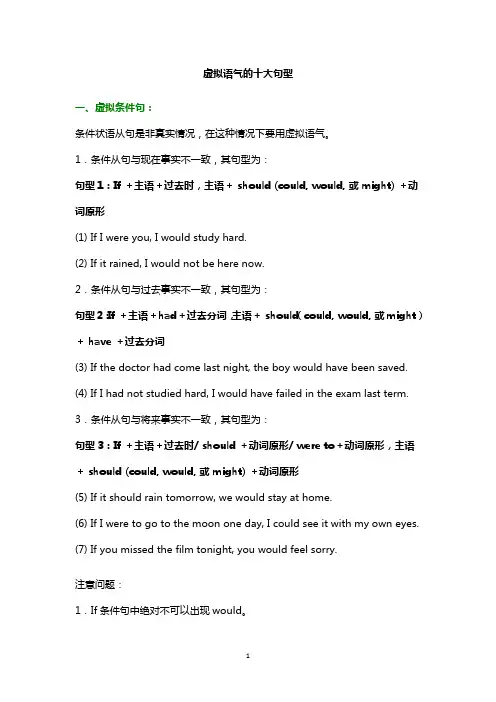
虚拟语气的十大句型一、虚拟条件句:条件状语从句是非真实情况,在这种情况下要用虚拟语气。
1.条件从句与现在事实不一致,其句型为:句型1:If +主语+过去时,主语+ should (could, would, 或might) +动词原形(1) If I were you, I would study hard.(2) If it rained, I would not be here now.2.条件从句与过去事实不一致,其句型为:句型2:If +主语+had+过去分词,主语+ should(could, would, 或might)+ have +过去分词(3) If the doctor had come last night, the boy would have been saved.(4) If I had not studied hard, I would have failed in the exam last term. 3.条件从句与将来事实不一致,其句型为:句型3:If +主语+过去时/ should +动词原形/ were to+动词原形,主语+ should (could, would, 或might) +动词原形(5) If it should rain tomorrow, we would stay at home.(6) If I were to go to the moon one day, I could see it with my own eyes.(7) If you missed the film tonight, you would feel sorry.注意问题:1.If条件句中绝对不可以出现would。
2.根据句中的时间状语,有时可能出现“混合虚拟”的情况,即主句可能是现在的情况,条件句也许是发生在过去的情况,但都要遵守上述句型。
如:(8) If you had studied hard before, you would be a college student now and you would graduate from a college in four years’ time.3.条件句中如果出现were, had, should可省去if,将主语与这些词倒装。
初中的解析虚拟语气的用法与句型
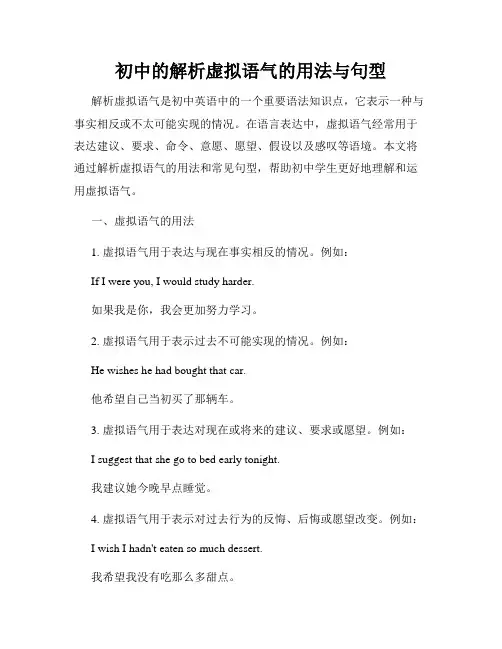
初中的解析虚拟语气的用法与句型解析虚拟语气是初中英语中的一个重要语法知识点,它表示一种与事实相反或不太可能实现的情况。
在语言表达中,虚拟语气经常用于表达建议、要求、命令、意愿、愿望、假设以及感叹等语境。
本文将通过解析虚拟语气的用法和常见句型,帮助初中学生更好地理解和运用虚拟语气。
一、虚拟语气的用法1. 虚拟语气用于表达与现在事实相反的情况。
例如:If I were you, I would study harder.如果我是你,我会更加努力学习。
2. 虚拟语气用于表示过去不可能实现的情况。
例如:He wishes he had bought that car.他希望自己当初买了那辆车。
3. 虚拟语气用于表达对现在或将来的建议、要求或愿望。
例如:I suggest that she go to bed early tonight.我建议她今晚早点睡觉。
4. 虚拟语气用于表示对过去行为的反悔、后悔或愿望改变。
例如:I wish I hadn't eaten so much dessert.我希望我没有吃那么多甜点。
5. 虚拟语气用于表示对某种假设或条件的情况下的想象。
例如:If I had a million dollars, I would travel around the world.如果我有一百万美元,我会环游世界。
二、虚拟语气的常见句型1. 条件句虚拟语气在条件句中,虚拟语气常常与过去时态连用。
例如:If I were rich, I would buy a big house.如果我有钱,我会买一栋大房子。
2. 祝愿句虚拟语气在表示祝愿的句子中,虚拟语气通常使用“wish”引导,后跟过去式或过去完成式。
例如:I wish I could go to the party with you.我希望我能和你一起去参加聚会。
3. 建议句虚拟语气在表示建议的句子中,虚拟语气通常使用“suggest”、“recommend”等动词引导,后跟从句的动词原形。
虚拟语气15种句型
3.as if / as though后的表语或状语从句 (与wish相同)
含义 动 词 形 式
例句
现在 did / were
He looks as if he knew the little girl.
过去 Have done
It appeared as if nothing had
happened.
5.动词形式为(should)+do 的虚拟
2. It’s + adj.+that 的主语从句 (adj: necessary / essential/
important / natural / strange / possible / impossible
eg. It is important that we should attend the meeting.
• 对过去的猜测 • 肯定 must have done • 否定 can / could not have done • 可能 may / might have done
• 本应该做(实际没有做,有责备意思) • should have done • shouldn’t have done • 本来有必要作(实际没有做,不含责
desire 命令:order / command/ 坚持:insist 不管是动词还是名词,不管是主动还是被动
,不管是引导主语从句, 宾语从句, 表语 从句还是同位语从句, 都要用(should) do
5.动词形式为(should)+do 的虚拟
• My suggestion is that we should listen to his opinion first.
It is time that we stopped work and went home.
虚拟语气分三种情况来掌握
虚拟语气分三种情况来掌握:1、虚拟条件句。
2、名词性虚拟语气。
3、虚拟语气的其他用语。
一、虚拟条件句:条件状语从句是非真实情况,在这种情况下要用虚拟语气。
1、条件从句与现在事实不一致,其句型为:If 主语+过去时,主语+should(could, would,或might)+动词原形,如:If I were you, I wouldstudyhard.If it rained, I wouldnot be here now.2、条件从句与过去事实不一致,句型为:If 主语+had+过去分词,主语+should(could, would,或might)+have+过去分词,如:If the doctor had come last night, the boy wouldhave saved.If I had not studie d hard, I wouldhave failed in the exam last term.3、条件从句与将来事实不一致,句型为:+do,主语+should(could…)+原形do过去时(与现在事实条件句一样)。
If it should rain tomorr ow, we wouldstay at home.If I were to go to the moon one day, I couldsee it with my own eyes.If you missed the film to night, you wouldfeel sorry.注意问题:1、If条件句中绝对不可出现“would”。
2、根据句中的时间状语,有时可能出现“混合虚拟”的情况,即主句可能是现在的情况,条件句也许是发生在过去的情况,但都是遵守上述句型。
3、在条件句中如果出现we re, had, should可省去if,将主语与这些词倒装,例如:Had the doctor come last night, the boy wouldhave saved.Were I to go to the moon one day, I wouldsee it with my own eyes.Should it rain tomorr ow, we wouldstay at home.二、名词性虚拟语气:在表示命令、建议要求、惊叹时的名词性从句中需用虚拟语气,基本句型:主语+(should)+动词原形,如:Mother insist ed that John go to bed at 9 o’clock.(宾语从句)We sugges ted that the meetin g should not be held.It was requir ed that the cropsshould be harves ted at once.(主语从句)The sugges tionthat he be invite d was reject ed.(同位语从句)That is theirdemand that theirwagesbe increa sed.(表语从句)注意:在这种句子中绝不出现“would”“must”“could”等。
虚拟语气句型及其表现形式
虚拟语气句型及其表现形式英语句子根据语气可以分三种:陈述语气,祈使语气和虚拟语气。
【概念】虚拟语气常用来表示假设、愿望、猜测、比喻或决定、主张、建议和命令等。
虚拟语气主要用于以下一些情况:一.在由if引导的非真实条件状语从句中If he were not ill in bed, he might come to class.If I hadn’t forgotten your phone number, I should have called you last Sunday.If I were to do it again tomorrow, I might do it in different ways.注意:⑪如果从句中有助动词had, should, were,可以省略if,并采用部分倒装形式,但如果从句中没有,则不能这样做。
例:Had he seen you yesterday, he would have asked you about it.Should it (Were it to) rain tomorrow, the crops would be saved.小练习:If he were not ill in bed, he might come to class.__________________________________________.If I had enough money, I would buy a new car.__________________________________________.⑫如果主句的谓语和从句的谓语在时间上不一致,采用混合时间虚拟。
如一个事情发生在过去,一个是现在发生的等。
这时动词的形式要根据它所表示的时间来调整。
例:If I were you, I would have attended the lecture.如果我是你,我就去听演讲了。
虚拟语气,汉译英句型
常考虚拟语气句型第一种:由“ if ”引导的虚拟句子1. 与现在的事实相反:[If --- + were/did---, --- + would do---]If I were you , I would marry him. 如果我是你,就会嫁给他。
2. 与过去的事实相反:[If --- + had done---, --- +would have done---]If you had worked hard , you would have passed the exam.如果你用功学习,就会通过考试了。
3. 与将来的事实可能相反:[If ---+ should do---, ---+ would do---]If it should rain tomorrow , what would you do ? 如果明天下雨,你怎么办?第二种:用在表示要求、建议、命令等的动词或名词从句中,从句谓语形式为:“---(should ) + do sth”(在美语中should常省去) 。
insist (坚持) , suggest (建议) , order(命令) , propose (建议) , demand (要求) , command (命令) , advise (建议) , desire (要求、请求) , request (请求) , require (需要、要求) , ask (要求) , prefer (宁愿), recommend(推荐) , arrange ( 安排) , advocate ( 拥护、提倡) ,maintain(坚决主张)等后面的宾语从句中。
第三种:用在“It + be + important (,necessary , natural , essen tial , strange , absurd , amazing , annoying , desirable, surprising , vital , advisable , anxious , compulsory , crucial , imperative , eager , fitting , possible , impossible , improper , obligatory , probable , preferable , strange , urgent 等, 以及insisted , suggested , ordered , requested , arranged , recommended 等) + that ---”结构中的that 引导的主语从句中,从句谓语形式为:“---(should ) + do sth”(在美语中should常省去) 。
- 1、下载文档前请自行甄别文档内容的完整性,平台不提供额外的编辑、内容补充、找答案等附加服务。
- 2、"仅部分预览"的文档,不可在线预览部分如存在完整性等问题,可反馈申请退款(可完整预览的文档不适用该条件!)。
- 3、如文档侵犯您的权益,请联系客服反馈,我们会尽快为您处理(人工客服工作时间:9:00-18:30)。
虚拟语气与各种句型一、I wish句型中的虚拟语气I wish后面的宾语从句,表示不可能实现的愿望。
其动词形式有三种:1. 动词用过去式,表示与现在事实相反的一种愿望。
2. 动词用过去完成式,表示与过去事实相反的愿望。
3. 动词用would/should +动词原形,表示与将来事实很可能相反或不可能实现的愿望。
如:I wish I were a doctor.我希望我是一名医生。
I wish you hadn’t given him my telephone number.我真希望你没把我的电话号码给他。
I wish you’d come back before Christmas.我多么希望你在圣诞节之前回来。
[典型考例]How I wish every family_________a large house with a beautiful garden!(NMET02上海春)A. hasB. hadC. will haveD. had had二、If only句型中的虚拟语气If only引导的句子表示“但愿”,“要是……就好了”。
其用法和I wish 的句型基本相同,只是更具感情色彩。
在If only句型中,动词用过去式,表示一种意愿或假设;动词用过去完成式,表示希望出现和过去事实相反的情况;动词用would +动词原形,表示一时很难实现的愿望。
如:If only I had more time to think about it!但愿我有更多的时间去考虑它。
If only the explosion had not happened!爆炸要是没有发生就好了。
If only he had not eaten so much sugar!要是他不吃那么多糖就好了。
[典型考例1]If only he_________quietly as the doctor instructed, he would not suffer so much now. (NMET2000上海)A. liesB. layC. had lainD. should lie[典型考例2] Look at the trouble I am in! If only I_________your advice. (NMET’03 上海)A. followedB. would followC. had followedD. should follow三、“It’s (high) time that…”句型中的虚拟语气“It’s time that...”句型表示“该是……的时候了”,谓语动词用一般过去式,有时为了强调,在time之前加high一词,表示“早该是……的时候了”。
如:It’s time somebody taught you how to behave yourself.该有人教你如何接人待物了。
It’s midnight; it’s (high) time we went bed.半夜了,我们该睡觉了。
It’s (high) time that we did something to stop pollution.到了我们采取行动制止污染的时候了。
四、would rather /sooner句型中的虚拟语气would rather/sooner句型表示“宁愿”,谓语动词用一般过去式表示尚未发生的动作;用过去完成时表示对已经发生的动作的某种愿望。
如:I would rather you came tomorrow.我宁愿你明天来。
I would rather he hadn’t been so rude in the past.我但愿他不曾那么粗鲁。
五、so that / in order that...句型中的虚拟语气在so that / in order that...引导的目的状态从句中常用should/ might/could +动词原形表示虚拟语气。
如:She spoke loudly so that everyone could hear her.她大声说话为了能让每个人听到。
They went to the seaside in order that they could enjoy their vacation together.他们去了海边为了能享受一起度假的乐趣。
六、as if / though 句型中的虚拟语气在as if/though引导的方式状语从句中,谓语动词用过去式表示和现在事实相反或有所怀疑;用过去完成式表示对过去事实的假设。
但是,如是表示的情况是真实的或实现的可能性很大时,句中的谓语动词用陈述语气。
如: He is running about as if he were mad.他跑来跑去像疯了似的。
He appeared as if he had known nothing about it.他看上去似乎对此一无所知。
It looks as if it is going to rain.看起来天要下雨了。
He talks as if he is drunk.他说起话来好像醉了。
[典型考例]When a pencil is partly in a glass of water, it looks as if it_________.(NMET95)A. breaksB. has brokenC. were brokenD. had been broken七、in case/for fear句型中的虚拟语气in case表示“以防万一”,for fear表示“唯恐,免得”,由它们引出的句型中,通常用“should +动词原形”构成。
如:Take some money with you in case you should need it.随身带点钱,以防万一。
He put his overcoat over him for fear (that) he should catch cold.他披上大衣,怕感冒。
He is working hard for fear (that) he should fall behind.他努力工作生怕落在人后。
八、but that句型中的虚拟语气but that表示“要不是……”,由would/should+动词原形构成谓语。
如:But that he saw it (If he hadn’t seen it ), he wouldn’t have believed it.要不是亲眼所见,他真不敢相信。
But that he helps (If he didn’t help), I should fail.要不是他帮忙,我肯定不及格。
九、错综时间条件句中的虚拟语气有时虚拟条件从句表示的动作和主句表示的动作发生的时间不一致,遇到这种情况,就要根据不同的时间概念,适当调整主句和从句的动词。
如:If we had set out earlier, we wouldn’t be walking in the rain.如果我们早点动身,现在就不会在雨中行走了。
If I were you, I w ouldn’t have watched TV last night.假如我是你的话,我昨晚就不会看电视了。
If the doctor hadn’t come, the patient would be dead by now.要是大夫不来的话,病人现在就会死了。
[典型考例] It is hard for me to imagine what I would be doing today if I_________in love, at the age of seven, with the Melinda Cox Library in my home-town (NMET02上海)A. wouldn’t have fallenB. had not fallenC. should fallD. were to fall十、“If it were not for...”句型中的虚拟语气“If it were not for...”句型意为“如果没有……”,“要不是”,用“should/would +动词原形”表示同现在事实相反的虚拟语气;“If it had not been for...”句型意为“如果当时没有……”,谓语动词用“would +完成式”,表示与过去事实相反的虚拟语气。
如:If it were not for the rain, the crops should / would die.如果没有雨,庄稼就会死了。
If it had not been for your timely help, I would have failed.如果当时没有你及时的帮助,我会失败的。
十一、含蓄条件句中的虚拟语气在英语虚拟语气中,有时表示假设的虚拟条件不一定都有明显的虚拟条件从句,而是利用某些词、短语或通过上下文表现出来。
常用的词或短语有:with, without, but for, otherwise, or, but等。
如:Without air, there would be no living things.没有空气便没有生物。
But for their help,we couldn’t get over the difficulties.要是没有他们的帮助,我们是克服不了这些困难的。
He is not a careful driver, otherwise he wouldn’t have had that accident.他不是个细心的司机,不然的话他不会出那个事故。
He would have given you more help, but he was so busy.他本会给你更多的帮助,但是他那时太忙了。
[典型考例1] Yesterday Jane walked away from the discussion. Other-wise, she_________something she would regret later. (NMET96上海)A. had saidB. saidC. might sayD. might have said[典型考例2] Without the air to hold some of the sun’s he at, the earth at night_________, too cold for us to live.(NMET97 上海)A. would be freezing coldB. will be freezing coldlyC. would be frozen coldD. can freeze coldly十二、独立主格结构中的虚拟语气在独立主格结构中也经常用虚拟语气,表示一种遗憾。
